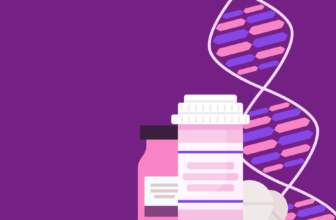
[adinserter block=”3″]
A woman’s reproductive and overall health depend on the hormone estrogen. An imbalance in estrogen levels may impact your physical and emotional health. Low estrogen symptoms, the primary hormone separating men and women, can cause hot flashes, sore breasts, and sleeplessness. Estrogen supports several other critical bodily processes and is a crucial hormone that aids in female sexual development and the reproductive system.
Therefore, even though hormone changes are natural at specific points in a woman’s life, enough estrogen levels are necessary for women to maintain their health and happiness. Estrogen low symptoms can be noticed through changes in menstrual patterns, hot flashes, and decreased bone density.
In this article, we will look into what Estrogen does, the symptoms of low Estrogen in women, and what causes low symptoms, so continue reading to know more.
What does Estrogen do?
Estrogen is essential for several physiological processes and is frequently called the “fountain of youth” in females. This hormone, mostly made in the ovaries, governs the female reproductive system and impacts several elements of a woman’s health.
During puberty, Estrogen plays a role in developing secondary sexual traits such as breast development and expanding hips. It controls the development and shedding of the uterine lining, which is crucial for the menstrual cycle.
Beyond its effects on fertility, Estrogen affects bone health by promoting calcium absorption and preserving bone density. The many functions of Estrogen also include preserving normal cholesterol levels and enhancing cardiovascular health.
Finally, Estrogen is important for sexual function because it promotes vaginal lubrication and softness.
What are the low estrogen symptoms?
Understanding the warning signs of an estrogen imbalance is crucial because the effects of low estrogen symptoms on your mental, emotional, and physical well-being are severe.
1. Gaining weight
Weight gain is a typical low estrogen levels symptoms. This is so because Estrogen has a role in controlling weight-related processes, including glucose metabolism. So, even if your lifestyle hasn’t changed, it’s simple to weight gain when estrogen levels are lower than normal.
2. Breast tenderness
According to Harvard Health, the breasts have a “stimulating effect” on Estrogen, so fluctuating or low estrogen levels may make the breasts feel painful. Low Estrogen can make the breasts sore and lead them to retain more fluid than usual, giving them a “full” sensation.
3. Painful sex
Vaginal wall thickness is maintained in large part by Estrogen. As a result, as estrogen levels fall, the connective tissue in the vagina thins down, which logically makes intercourse uncomfortable and painful. Lower estrogen levels may cause vaginal dryness and weaken the vaginal walls, further increasing the discomfort of intercourse.
4. Vaginal dryness
Lower estrogen levels may cause the painful sensation of vaginal dryness because Estrogen helps keep the vagina moist. Numerous unpleasant symptoms, including painful intercourse, discomfort in the vaginal region, and a higher chance of getting urinary tract infections (UTIs), can result from this.
5. Depression or mood swings
Poor estrogen levels are linked to a higher risk of mood fluctuations, poor mood, and depression, according to research, which demonstrates that Estrogen is essential for mood control. While play has several ways, one of the most important is Estrogen’s impact on serotonin and endorphin synthesis.
6. Dry skin
Your skin looks clean and smooth because of Estrogen’s role in controlling the body’s creation of sebum. Additionally, it is believed to aid healing and lower inflammation. The skin may become tight, dry, and itchy when estrogen levels fall.
7. Night sweats and hot flushes
Other frequent indications of low estrogen levels symptoms are hot flashes and nocturnal sweats. Researchers generally concur that decreased estrogen levels can make your body’s internal thermostat, or hypothalamus, more sensitive and responsive to variations in body temperature.
Thus, Night sweats and hot flushes are some of the very common Estrogen low symptoms that can disrupt sleep and daily comfort for many women experiencing hormonal fluctuations.
8. Sleeping problems (insomnia)
According to research, Estrogen significantly impacts the body’s capacity for sleep. This is so because Estrogen influences specific neurotransmitters, including serotonin and norepinephrine, which impact mood and sleep habits, in addition to helping to control body temperature. Sleeping and maintaining sleep quality is challenging when estrogen levels are low.
9. Brittle bones and Osteoporosis
Estrogen works with vitamin D, calcium, and other minerals regarding strong, robust bones. However, when estrogen levels decrease, bone strength & density start to degrade, usually starting in the spine, which causes a stoop to gradually occur.
Amazingly, most women with fragile bones are unaware of it until they break a bone and their doctor detects the beginnings of Osteoporosis.
10. Headache
Headaches are also known to be brought on by low estrogen levels. This is why having a headache before, during, or after your period is common since estrogen levels drop in the days before your period. A migraine will be experienced by about two-thirds of migraine sufferers right before their period.
11. Urinary tract infections
Oestrogen also contributes to urinary tract infections, even though hazardous bacteria entering the urinary system are generally blamed.
When estrogen levels drop, the urethra lining thins and weakens, making it easier for dangerous bacteria to enter and increasing the risk of recurrent urinary tract infections. Estrogen helps maintain the lining of the urethra as a solid, healthy structure.
Also Read: 7 Ways to Prevent Urinary Tract Infection
12. Irregular periods
More precisely, the onset of the period is brought on by the decline in Estrogen that occurs near the end of the cycle. The process sometimes malfunctions when estrogen levels are too low, which can cause irregular or missed periods.
13. Increased belly fat
Many of your body’s processes, including your metabolism, are regulated by Estrogen. You may see an increase in belly fat deposits if the estrogen levels drop as you age or due to underlying health problems.
Even with a balanced diet and regular exercise, it might be tough to eliminate abdominal fat that is tied to hormones.
What Causes Low Estrogen Production?
Estrogen levels frequently increase and decrease throughout a woman’s life, especially during menstruation and pregnancy. However, low estrogen levels are typically a symptom of a more profound physiological shift, such as perimenopause or menopause.
This is mostly because the ovaries’ follicles produce most Estrogen. However, when perimenopause sets in, the ovaries are programmed to produce less and less Estrogen to prepare the body for menopause, when the production of Estrogen.
Low Estrogen may be a sign of an underlying ailment, such as ovarian cysts, anorexia, renal disease, Turner syndrome, excessive exercise, or pituitary gland issues, in women who are not menopausal.
What to do if someone is experiencing symptoms of low Estrogen?
If you’re experiencing symptoms of low estrogen in women, such as night sweats and hot flushes, here’s what you can do:
-
Consult a Doctor
If you suspect you have low estrogen levels and are experiencing symptoms, it’s important to consult a healthcare professional. They can diagnose your condition and provide appropriate guidance.
-
Hormone Replacement Therapy (HRT)
In some cases, doctors might recommend hormone replacement therapy to help alleviate the low estrogen symptoms. This involves taking estrogen in various forms, such as pills, patches, creams, or injections, under medical supervision.
-
Lifestyle Changes
Maintaining a healthy lifestyle can also make a difference. Regular exercise, a balanced diet rich in nutrients, and stress reduction techniques like yoga or meditation can help manage symptoms.
-
Stay Hydrated and Cool
To handle those sudden hot feelings and sweaty nights, keeping your surroundings cool and ensuring there’s enough fresh air is good. Wear clothes that are light and let your skin breathe. Also, remember to drink enough water to stay hydrated. These simple steps can make those hot moments and sweaty nights not bother you as much, and you’ll feel more comfortable.
-
Over-the-Counter Remedies
Some over-the-counter products, such as cooling pillows or sheets, can help manage night sweats. Herbal supplements like black cohosh might also provide relief for some individuals, but consult your doctor before trying any supplements.
-
Regular Sleep Patterns
Make sure you go to bed and wake up at the same time every day. This helps your body get used to a routine. Also, set up your sleeping area to be cozy and nice. Use comfy blankets and pillows, and keep your room not too hot or too cold. Doing these things can help make night sweats bother you less while you’re trying to sleep. When you’re well-rested, you’ll feel better during the day too!
What are the high estrogen vs low estrogen symptoms?
The comparison of the common symptoms associated with high estrogen vs low estrogen levels:
High Estrogen Symptoms:
- Breast tenderness/swelling
- Mood changes/irritability
- Weight gain (especially around the hips and thighs)
- Fatigue
- Bloating/fluid retention
- Heavy or irregular periods
- Migraines/headaches
- Decreased libido
- Sleep problems
Low Estrogen Symptoms:
- Hot flashes/night sweats
- Vaginal dryness/painful intercourse
- Mood changes (depression/anxiety)
- Trouble concentrating/memory problems
- Insomnia
- Heart palpitations
- Joint pain
- Loss of bone density
- Bladder control issues
- Hair thinning
- Cracked/dry skin
Conclusion
Hormones like Estrogen significantly influence your general health. Your estrogen levels may decline due to aging, certain illnesses, or genetic conditions. Low estrogen symptoms might hamper the growth and functioning of the sexual organs. Additionally, they can raise your risk for cardiovascular disease, obesity, and Osteoporosis.
The effectiveness of treatments has increased with time. Your specific cause of low Estrogen will dictate your course of treatment, including the dose and time frame. Numerous treatments are available for low estrogen levels, which can cause symptoms ranging from mild vaginal dryness to temporary breast pain.
Popular Searches
Kill tooth pain nerve in 3 seconds permanently | how to get unbloated in 5 minutes | how i cured my eustachian tube dysfunction | how to make yourself sick | ligma disease | how to maintain erection for 30 minutes | heart stent surgery | how i cured my lichen sclerosus | Probiotic foods | how to dislodge food stuck in esophagus | Tablets for loose Motion | What kills toenail fungus instantly | heart healthy foods | best way to detox your body in 24 hours | What are the benefits of Fenugreek | ketamine infusion | social anxiety test | When Am I Ovulating | Benefits of Dermaplaning | Is Polio Contagious | Hypothyroidism | why do my knees hurt when i run | How to Detoxify Your Body | Aspercreme with Lidocaine
[adinserter block=”3″]
Credit : Source Post






